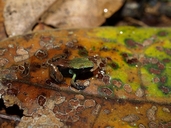|
Description
27-28 mm. Dorsal colour variable: uniformly brown, or with partly or almost entirely green back. Flanks black or partly greenish, with relatively large green flank blotches. No sharply delimited rostral stripes and no flashmarks. Iris with light pigment in its upper part. Ventrally black with blue spots and without red colour. Throat without continuous horseshoe marking (Glaw and Vences 2007).
Similar species: M. pulchra and M. baroni differ by reddish ventral colour (Glaw and Vences 2007). Distribution and Habitat
Country distribution from AmphibiaWeb's database: Madagascar
Anjanaharibe, Mananara-Nord, Manongarivo (1240 m elevation), Marojejy, Tsararano.
It occurs between 100-1,240 m asl on the ground along streams in rainforest and forest edge, but not in severely degraded habitats (Raxworthy and Andreone 2008).Life History, Abundance, Activity, and Special Behaviors
Habits: Along streams in primary rainforest. Active during the day on the ground (Glaw and Vences 2007). Breeding takes place in streams, where the larvae develop (Raxworthy and Andreone 2008).
Calls: Series of short single-click notes (Glaw and Vences 2007).
Trends and Threats
Locally abundant but decreasing. It occurs in several protected areas (Raxworthy and Andreone 2008). Possible reasons for amphibian decline General habitat alteration and loss
Habitat modification from deforestation, or logging related activities
Intensified agriculture or grazing
Urbanization
Habitat fragmentation
Comments
Taken with permission from Glaw and Vences (2007).
References
Glaw, F., and Vences, M. (2007). Field Guide to the Amphibians and Reptiles of Madagascar. Third Edition. Vences and Glaw Verlag, Köln.
Raxworthy, C. and Andreone, F. (2008). Mantella nigricans. In: IUCN 2008. 2008 IUCN Red List of Threatened Species. www.iucnredlist.org. Downloaded on 22 April 2009.
Originally submitted by: Miguel Vences and Frank Glaw (first posted 2009-04-22)
Edited by: Kellie Whittaker (2009-04-28)Species Account Citation: AmphibiaWeb 2009 Mantella nigricans <https://amphibiaweb.org/species/6023> University of California, Berkeley, CA, USA. Accessed Jun 2, 2025.
Feedback or comments about this page.
Citation: AmphibiaWeb. 2025. <https://amphibiaweb.org> University of California, Berkeley, CA, USA. Accessed 2 Jun 2025.
AmphibiaWeb's policy on data use.
| 